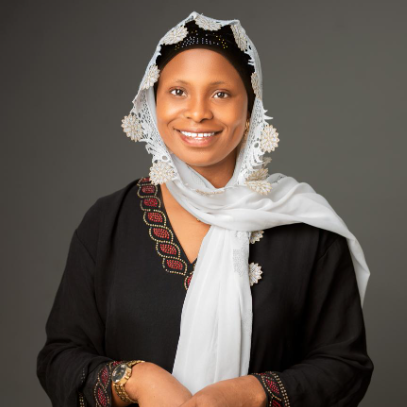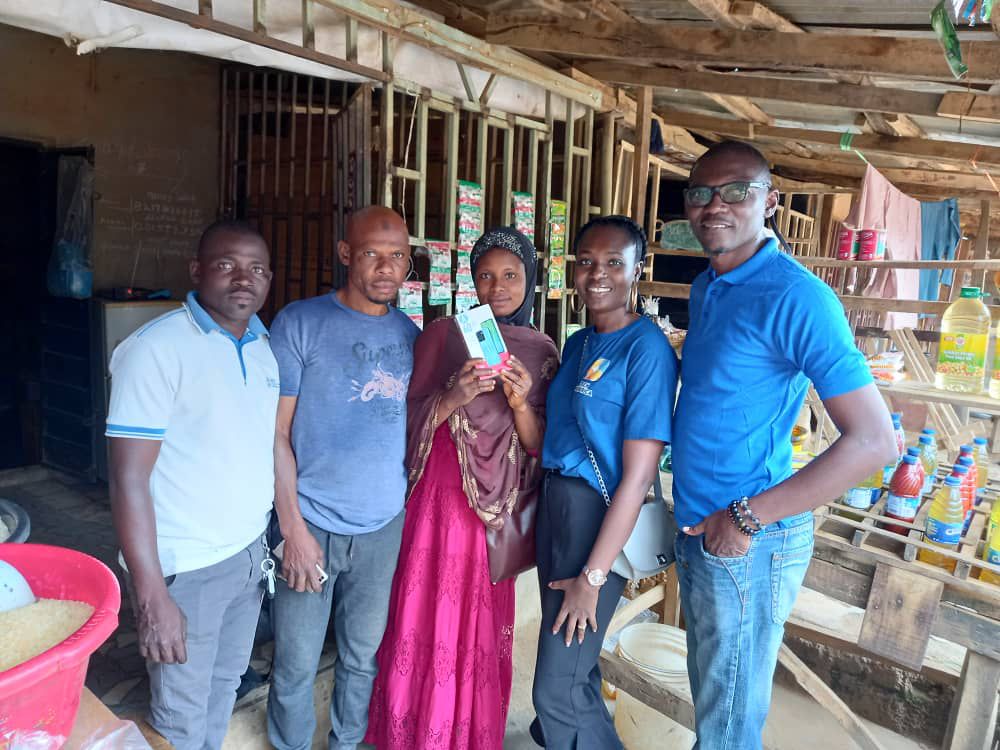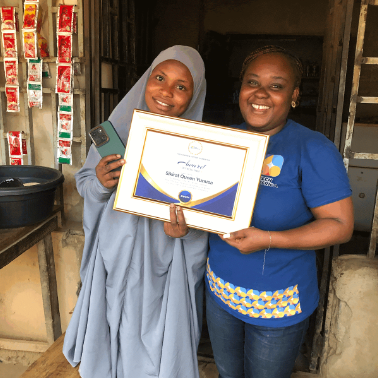Queen's Story
Breaking the Cycle: Rewriting a Future with Digital Skills and Financial Access

From the beginning, Queen’s life was a struggle. Born in Kogi state, Nigeria, Queen was raised by her grandmother because her parents couldn’t afford to care for her. Yet her grandmother also struggled and could only fund her education up to secondary school.
Lacking any marketable skills, Queen learned to sew while also helping her grandmother fry and sell the roadside food known as akara. It was just the two of them, so Queen had to wake as early as 4am every day to wash and grind the brown beans. By 8 a.m., she’d finish selling the akara, then go learn to sew.
Without an education, her future earning potential looked bleak – and she seemed destined to remain stuck in the cycle of poverty.
“I wish I’d gone to the university,” says Queen. “I know I wouldn’t have been so poor.”
Once she married – and had to feed and raise her four children – life proved even more challenging. However, to her credit, Queen also possessed energy and ambition. What she truly lacked was the know-how to build a business.
With the little money she had, Queen started selling fuel outside her home, by the road. She first bought 20 liters and sold it at the black-market rate. Once she’d sold a portion of it, she’d re-invest the profit and buy more fuel. However, she had no shade or cover over her business and was exposed to the elements, selling regardless of the pounding sun or pouring rain. Yet, her hard work paid off; she eventually rented a shop, from which she also began selling palm oil, groundnut oil, and other food items – based on customer demand. Yet she had no long-term plan for how to grow her operation, to achieve profitability or sustainability.
That is, until one day when Queen learned about Tech Herfrica. Her shop neighbor told her about an interesting training at a nearby school. “I decided to be open-minded and listen, because I felt I had nothing to lose,” she says.
The training was aimed at poor, rural Nigerian women like her, to equip them with what they needed most: basic digital and financial literacy skills. Ideally, this skillset wouldn’t just enable their business to thrive, but would elevate their family’s quality of life. Perhaps it would even lift them out of the unrelenting cycle of poverty. These also happen to be the objectives of several of the world’s 17 Sustainable Development Goals.
The first thing that Queen and the other participants were taught was how to take their modest business and enter the digital space. She was surprised to learn that people in other cities could, and would, buy what she was selling – at the rate she set. But she could only reach them if she had a smartphone and Internet access. Next, she’d establish a social-media presence – as if a virtual shop – on platforms like Facebook and WhatsApp.
Meanwhile, Queen and her fellow trainees also learned the importance of: maintaining records of her business revenue; monitoring the inflow and outflow of cash; and separating her business profits from her personal finances. For example, instead of using the same bank account for both her business and personal expenses, she started using separate accounts.
After the training, Queen was provided with a smartphone – she’d never owned one before – and shown how to use it to attract more customers. For example, she joined different Facebook groups and advertised her products to new customers in faraway locations, which helped increase demand.

“I had no idea that people in other states could reach me on the Internet, to ask me to send them foodstuff,” she says. “Before, I’d also handled my business money haphazardly, using most of it to care for my family, without minding that my business revenue declined. But now, I separate the money I use for my business and for my family.”
Queen isn’t the only Nigerian recipient, of course, but now one of more than 4,000 women who’ve received Tech Herfrica’s digital and financial literacy trainings and tools to improve their skills. They’ve learned to leverage technology to achieve business growth and tangible increases in income. It’s a strong start for an NGO that’s just over a year old. Yet these 4,000 women are a drop in the bucket in the overall need – and in what Tech Herfrica is striving to achieve. According to our research ( here and here), among the greatest hurdles that rural women face is this digital divide.
It starts with the principle of equal access, says the Tech Herfrica Founder, Imade Bibowei-Osuobeni. “Because of digital exclusion, young girls and women in rural areas can’t access the same level of education or quality of business opportunities,” says Bibowei-Osuobeni. “This leads to deepening poverty, digital illiteracy and social exclusion. Thus, they keep selling their goods for pennies and are stuck in abject poverty – despite their hard work.”
Queen, though, now stands as a shining example of what the proper tools and training can achieve. Under Tech Herfrica’s Access to Financial Services Initiative, she even received a non-interest loan – to further stock her shop and meet demand. In fact, through this initiative, Queen was appointed to lead one cluster of loan recipients, to ensure that no member defaults on her loan repayment. Her cluster has gone through three loan cycles without any default, which earned her an award on the 2024 International Women’s Day.

“Since the day I joined that first training, my life has changed,” she says. “Today, I have so many customers – across Nigeria. I never thought I’d be making this kind of money in my life. My business has grown and my sales have grown more than 10 times what I was doing before I engaged with Tech Herfrica”
More important, she says, is that her children’s future suddenly looks much brighter: “I know that they won’t suffer the way I did. With the help I’ve received, I’m breaking the cycle of poverty.”

